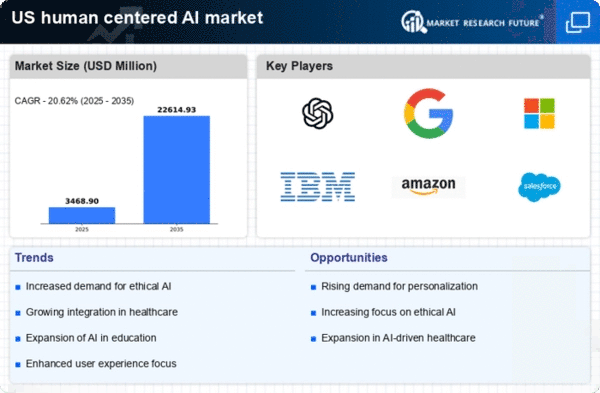Growing Focus on Data Privacy
The human centered-ai market is increasingly influenced by a growing focus on data privacy among consumers and organizations. As awareness of data security issues rises, users are demanding greater control over their personal information. This trend is prompting companies to adopt human centered-ai solutions that prioritize data protection and transparency. According to surveys, nearly 80% of consumers express concerns about how their data is used, which has led to a shift in how businesses approach AI development. Organizations are now more inclined to implement privacy-centric AI models that ensure compliance with regulations such as the California Consumer Privacy Act (CCPA). This emphasis on data privacy not only enhances user trust but also drives innovation in the human centered-ai market, as companies strive to create solutions that respect user privacy while delivering value.
Increased Demand for Personalization
The human centered-ai market is experiencing a notable surge in demand for personalized solutions. As consumers increasingly seek tailored experiences, businesses are compelled to integrate AI technologies that prioritize user preferences and behaviors. This shift is evident in sectors such as retail and healthcare, where personalized recommendations and treatments are becoming the norm. According to recent data, approximately 70% of consumers express a preference for personalized interactions, indicating a significant opportunity for companies to leverage human centered-ai to enhance customer satisfaction. This trend not only drives innovation but also fosters loyalty, as users are more likely to engage with brands that understand their unique needs. Consequently, the human centered-ai market is poised for substantial growth as organizations invest in technologies that facilitate this level of personalization.
Regulatory Support for AI Innovations
The human centered-ai market is benefiting from an evolving regulatory landscape that supports AI innovations. Recent initiatives by government agencies aim to create frameworks that encourage responsible AI development while ensuring user safety and privacy. For instance, the Federal Trade Commission has proposed guidelines that promote transparency in AI algorithms, which could enhance consumer trust. This regulatory support is crucial as it provides a clear pathway for companies to innovate without compromising ethical standards. As organizations navigate these regulations, they are likely to invest more in human centered-ai solutions that align with compliance requirements. This alignment not only mitigates risks but also positions companies favorably in the market, potentially leading to increased market share and consumer confidence in AI technologies.
Integration of AI in Workforce Training
The human centered-ai market is experiencing a transformative shift with the integration of AI technologies in workforce training programs. Organizations are increasingly recognizing the potential of AI to enhance employee skills and productivity through personalized learning experiences. By utilizing human centered-ai solutions, companies can tailor training modules to individual learning styles and paces, thereby improving overall effectiveness. Recent data suggests that organizations investing in AI-driven training solutions see a 30% increase in employee performance. This trend not only addresses the skills gap in various industries but also fosters a culture of continuous learning. As businesses continue to prioritize workforce development, the human centered-ai market is likely to expand, driven by the demand for innovative training solutions that leverage AI capabilities.
Advancements in Natural Language Processing
The human centered-ai market is witnessing rapid advancements in natural language processing (NLP) technologies, which are transforming user interactions with AI systems. These advancements enable machines to understand and respond to human language more effectively, thereby enhancing user experience. As NLP capabilities improve, applications in customer service, virtual assistants, and content generation are becoming more sophisticated. Recent studies indicate that the NLP market is projected to grow by over 20% annually, reflecting the increasing reliance on these technologies. This growth is likely to drive further investment in human centered-ai solutions, as businesses seek to leverage NLP to create more intuitive and engaging user interfaces. Consequently, the integration of advanced NLP into human centered-ai systems is expected to play a pivotal role in shaping the future of user interaction.
















